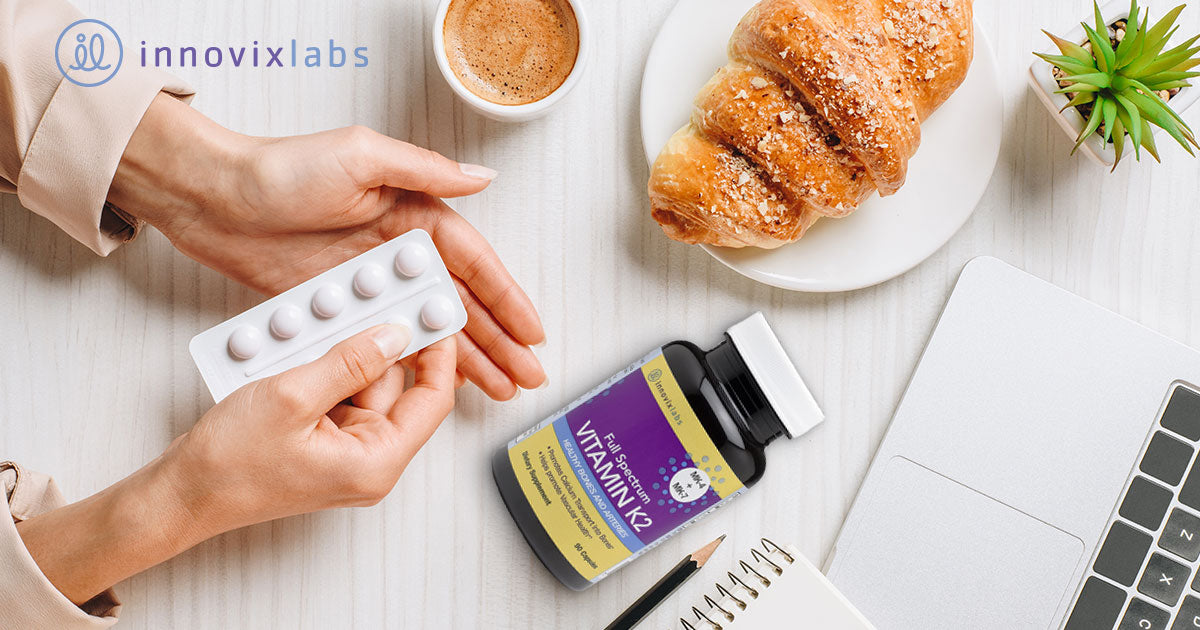by INNOVIXLABS on MAY 06, 2019
Vitamin K (especially K1) plays a special role in protecting us from cuts. It is responsible for making blood coagulate or thicken, to form a clot. Clotting stops the flow of blood anytime we scrape our knees or get a nasty paper cut.
There are times though, when doctors actually want to thin the blood. They want to slow down the time it takes a blood clot to form, with the goal of preventing heart attack or stroke. To do this, doctors prescribe anti-coagulant drugs.
Is Vitamin K2 a blood thinner?
Vitamin K (both K1 and K2) can interfere with blood thinning medications like Warfarin and Coumadin.
If you've been prescribed these drugs and you are also taking Vitamin K1 and/or K2, be sure to talk to your doctor.
If Vitamin K2 is taken at greater than 50 mcg per day, it can interfere with the blood thinning function of these drugs. (Virtually all K2 supplements contain more than 50 mcg per pill.)
Does this mean you have to completely avoid Vitamin K2 supplements or foods rich in Vitamin K2?
No.
There are a couple of things you can do to remain on anti-coagulant drugs (if your doctor deems it necessary) as well as consume a reasonable amount of Vitamin K2 to keep your bones strong and your arteries healthy:
Work with your doctor to find a balance that thins the blood yet does not weaken your bones - this will require multiple blood tests.
Talk to your doctor about anti-coagulant drugs that do not interfere with Vitamin K2.
What are Anti-Coagulant Drugs?
Anti-Coagulant drugs are used to treat or prevent blood clots or if your doctor feels you could benefit from blood thinning. If you've been diagnosed with a blood clot, you may be given Warfarin/Coumadin for a few months, possibly longer.
How do Anti-Coagulant Drugs like Coumadin and Warfarin Work?
Vitamin K (especially K1) is responsible for blood clotting - comes in handy if you get a cut. Warfarin works by interfering with how Vitamin K works. Specifically, it prevents the activation of Vitamin K-dependent clotting proteins. This is why these drugs are referred to as Vitamin K Antagonists. This slows the clotting process and 'thins' the blood.
In some cases, these drugs can be life-saving.
Is There Risk Associated with These Drugs?
Yes.
If you take too much Warfarin, you can wipe out most of your body's Vitamin K. This causes an artificial, drug-induced Vitamin K deficiency - for both K1 and K2.
If you take less Warfarin than needed, you'll protect your Vitamin K, but your blood thinning needs may go unaddressed.
Long term use of these drugs may be linked to an increased risk of bone loss as a result of chronic Vitamin K2 deficiency.
Long-term use of these drug may lower bone density and increase risk of fractures. It may also cause inappropriate calcium deposits in soft tissues like arteries, kidneys etc.
Mice that were fed K2-inhibiting Warfarin quickly developed arterial calcification. Feeding them K2 completely inhibits this effect. Whether K2 will do the same for humans needs more investigation.
If you are concerned about the effect this medication may have on your bone mineral density, talk to your doctor about testing for uncarboxylated osteocalcin or uncarboxylated GLA proteins. Both these markers are a good measure of your Vitamin K status and by extension, an indicator for bone density loss.
Are There Anti-Coagulant Drugs that do not Affect Vitamin K Status?
Yes.
Newer generation of anti-coagulant drugs do not affect Vitamin K status like Coumadin/Warfarin.
Newer generation of anticoagulation drugs such as Dabigatran, Rivaroxaban, and Apixaban do not interfere with Vitamin K1 and K2 function.
They require less blood monitoring while offering similar benefits as Warfarin.
These new drugs allow you to take effective doses of Vitamin K2 to maintain bone density while simultaneously thinning your blood - a balance that is difficult to achieve with Warfarin.
How do Vitamins K1 and K2 Affect INR?
INR (International Normalized Ratio) is a measure of clotting time. The lower your INR, the faster your blood clots. Conversely, the higher the INR, the 'thinner' the blood.
An INR range of 2.0 to 3.0 is the typical therapeutic range for people taking warfarin, while a number under 1 is considered normal for healthy folk.
Long-term consumption of Vitamin K1 of 700 mcg reduced INR values from 2 to 1.5. Vitamin K2 supplementation is more potent at reducing INR and 200 mcg of K2 will reduce INR values from 2 to 1.5.
Vitamin K2 supplementation higher than 50 mcg per day requires INR monitoring by your doctor because the K2 may be undoing some of the intended effect of Warfarin.
50 mcg of Vitamin K2 is what you'd get from 3 to 4 ounces of European hard cheese. This much K2 is expected to disturb INR by only about 10%, which may be an acceptable variability in your treatment. Please discuss with your doctor.
Managing a relatively steady INR while ingesting enough K2 to maintain strong bones is a balancing act that you and your doctor will have to sort out using blood tests.
You can use this tool to track INR levels.











